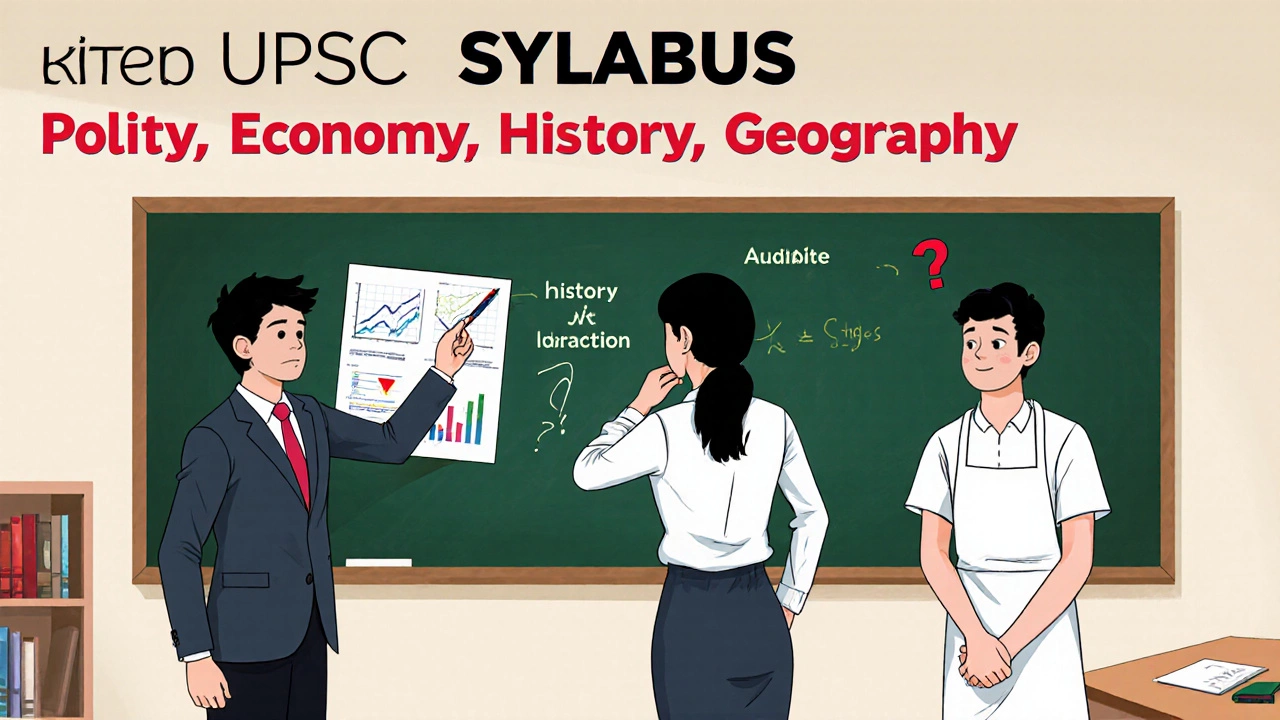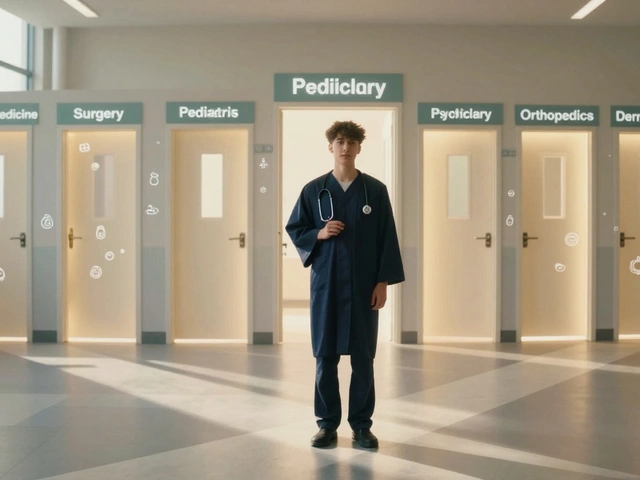Everyone talks about which degrees are in demand, which ones lead to high salaries, or which ones open doors to top jobs. But hardly anyone asks the real question: What is the least useful degree when you’re aiming for competitive exams? Not because it’s bad - but because it doesn’t help you get there.
Competitive exams don’t care about your major
Think about the big ones: UPSC Civil Services, SSC CGL, IBPS PO, NEET, JEE, CAT. What do they test? Critical thinking, reasoning, general awareness, quantitative ability, English comprehension, and current affairs. Not your thesis topic. Not your college GPA. Not whether you studied botany, philosophy, or interior design.These exams are designed to pick the most capable candidates - not the ones with the most impressive degrees. So if your degree doesn’t build skills that directly feed into those areas, it’s not useless. It’s just irrelevant to the exam.
The top three degrees that add little to competitive exam prep
Let’s be specific. Based on real results from past candidates and coaching center data, these three degrees consistently show up as the least helpful when you’re preparing for government or entrance exams:- Performing Arts - Yes, you learned discipline, stage presence, and creativity. But you didn’t learn how to solve linear equations, interpret constitutional articles, or analyze economic policies. These exams don’t ask for your dance routine.
- Fine Arts / Visual Arts - You can sketch a portrait, but can you calculate compound interest? Can you identify the writ jurisdiction of the Supreme Court? The skills don’t transfer.
- Liberal Arts (non-specialized) - Not all liberal arts degrees are equal. If you took a broad program with no focus on political science, economics, or history, you’re starting from zero when the exam expects you to know the difference between Articles 14 and 21 of the Indian Constitution.
These aren’t bad degrees. They’re valuable in other contexts. But if your goal is to crack UPSC or SSC, they don’t give you a head start. You’ll be learning everything from scratch - same as someone who studied engineering or commerce.
Why people still choose them
You might be wondering: if they’re so unhelpful, why do so many students pick them?Because they’re easy to get into. Low cutoffs. Less pressure. Parents think, “At least they’ll graduate.” Or the student thinks, “I hate math, so I’ll avoid science.” But then they wake up a year before the exam and realize: they’ve spent four years learning things that won’t show up on the test.
One student from Jaipur told me: “I did B.A. in History because I loved it. But when I started preparing for UPSC, I had to relearn basic geography and economics from NCERT books. My degree didn’t help - it just delayed my real prep.”

What degrees actually help
Here’s the flip side. These degrees give you a real edge:- Political Science / Public Administration - Direct overlap with GS Paper II and IV. You already know the structure of government, federalism, and fundamental rights.
- Economics - Makes Paper III (Economy) a breeze. You understand inflation, fiscal policy, and GDP calculations without memorizing.
- Engineering - Strong math and logical reasoning skills. Clears quantitative sections fast. Many top rankers in UPSC are engineers.
- Commerce / Accounting - Helps with financial statements, budgeting, and taxation questions in both prelims and mains.
It’s not about prestige. It’s about alignment. If your degree gives you a 6-month head start on 30% of the syllabus, that’s massive.
Can you still succeed with a “useless” degree?
Absolutely. Thousands do. But they work harder. They spend 12-18 months catching up on basics most candidates learned in college. They pay for extra coaching in economics, polity, and history. They lose sleep because they’re learning two things at once: exam prep and foundational knowledge.One candidate from Patna, who had a B.A. in English Literature, cleared UPSC in her third attempt. She said: “My degree taught me how to read critically. That helped in essay writing. But I spent 8 months just learning the Indian Constitution from scratch. If I’d studied Political Science, I’d have saved that time.”
So yes - you can win. But you’re starting at the back of the line.
What to do if you already have a “useless” degree
Don’t panic. Don’t drop out. Don’t regret. Just adjust.- Start with NCERTs - Class 6 to 12 textbooks in History, Geography, Polity, and Economics. They’re free, clear, and built for exam prep.
- Focus on high-yield subjects first - Polity and Current Affairs are worth 150+ marks in UPSC. Master those before diving into obscure topics.
- Use your degree as a strength - If you studied literature, your reading speed and comprehension are better than most. Use that to ace the essay paper.
- Join a coaching batch with beginners - Don’t feel ashamed. Everyone starts somewhere. Most coaching centers have “foundation batches” for non-graduates.

The real question isn’t “least useful” - it’s “most strategic”
The problem isn’t that some degrees are bad. The problem is that students choose degrees based on interest, ease, or pressure - not strategy.If you’re serious about competitive exams, treat your degree like a tool. Not a trophy. A tool. Would you pick a hammer to fix a leaky pipe? No. You’d pick a wrench. Same logic applies here.
There’s no such thing as a “useless” degree in life. But in the context of competitive exams? Some degrees are like carrying a backpack full of books you’ll never open on a hike. You’re not wrong for having them. You’re just making the climb harder than it needs to be.
What should you do now?
If you’re still in college:- If you’re in a low-alignment degree - start NCERTs now. Don’t wait till your final year.
- If you’re in a high-alignment degree - double down. Read newspapers daily. Solve previous papers. Join test series.
If you’ve already graduated:
- Stop asking “Is my degree useless?” Start asking “What do I need to learn next?”
- Make a 6-month plan: Polity → Economy → History → Geography → Current Affairs.
- Track your progress. If you’re scoring below 70% in prelims mock tests after 4 months, you’re behind. Adjust.
Competitive exams don’t reward degrees. They reward preparation. The degree is just where you started. The exam is where you finish.
Is a B.A. degree useless for UPSC?
No, a B.A. degree isn’t useless for UPSC - but its usefulness depends on what you studied. If you majored in Political Science, History, or Economics, it’s a big advantage. If you studied Fine Arts or Performing Arts, you’ll need to start from scratch on core subjects like polity and economy. The degree itself doesn’t matter - your preparation does.
Which degree has the highest success rate in UPSC?
Engineering graduates have the highest number of toppers in UPSC, not because engineering is easier, but because it builds strong analytical and problem-solving skills. Political Science and Economics graduates follow closely because their coursework overlaps directly with the UPSC syllabus. Success depends more on consistent preparation than the degree name.
Can I crack SSC CGL with a humanities degree?
Yes, many candidates with humanities degrees clear SSC CGL every year. The exam tests reasoning, quantitative aptitude, English, and general awareness - not your major. Your advantage? Strong reading and comprehension skills. Your challenge? Brushing up on math and basic statistics. With focused practice, it’s very doable.
Do I need to study my degree subject for competitive exams?
No. Competitive exams like UPSC, SSC, and IBPS test standardized subjects: polity, economy, history, geography, reasoning, English, and current affairs. Your degree subject doesn’t appear on the syllabus unless it’s directly related (like Political Science for UPSC). Focus on the exam pattern, not your college curriculum.
Should I change my degree if I want to prepare for competitive exams?
No, don’t change your degree. It’s too late, costly, and unnecessary. Instead, treat your degree as background and start building exam-specific knowledge. Use free resources like NCERTs, YouTube channels like Mrunal, and previous year papers. Your degree won’t hold you back - lack of planning will.
Final thought
The least useful degree for competitive exams isn’t the one with the worst reputation. It’s the one you think will help - but doesn’t. The one you picked because it was easy, not because it aligned with your goal. The one that gives you a false sense of progress while you’re falling behind in real prep.Success in competitive exams doesn’t come from where you studied. It comes from what you studied - and how consistently you studied it.














